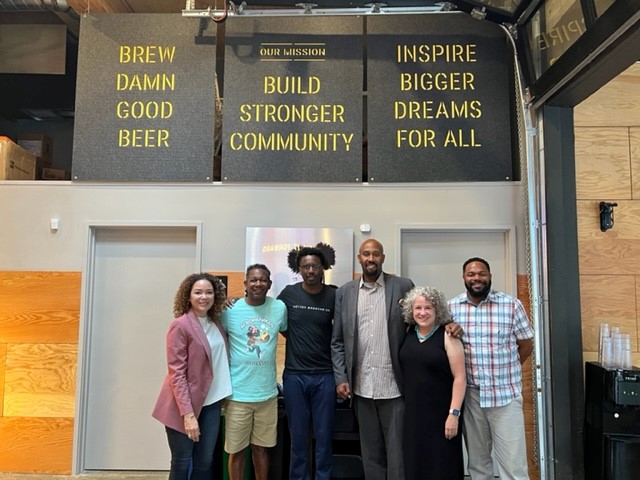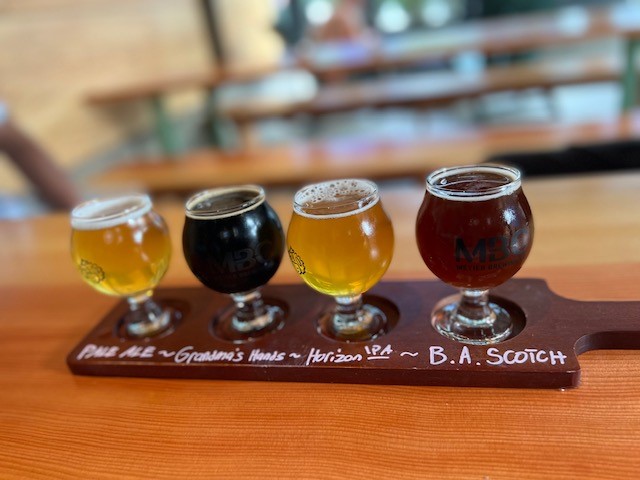By Jennifer Clark, Region 10 Advocate
“I wanted a place to go where at least some of the patrons looked like me,” explained Rodney Hines, co-founder of Métier Brewing Company in Seattle, WA. “I imagined others would too.” Métier is one of the few African American-owned breweries in the country. Though Rodney is in rare company now, he is working to change that by connecting with, collaborating with, and supporting other Black, Indigenous, and people of color (BIPOC)-owned businesses.
In September 2022, Rodney, along with his business partner Harold Fields, welcomed members of the Office of Advocacy at Métier’s flagship location on Cherry Street. Cherry Street is in the heart of the Central District, a historically African American neighborhood. The taproom is one of three Métier locations in the Seattle area. The original taproom, and the company’s brewing facility, is in Woodinville, WA. A third location, Steelheads Alley – named in honor of the Seattle Steelheads, Seattle’s Negro League baseball team – recently opened in partnership with the Seattle Mariners MLB team. This pub-room provides a place for fans to gather in the stadium neighborhood.
While Rodney brews the beverages and mans the taps, Harold fires up the food. Harold produces an array of products from his production kitchen in the Rainier Beach neighborhood under the brand “Umami Kushi,” which he then distributes to dine-in and retail venues, like Métier Brewing Company. Umami Kushi products are Harold’s unique fusion of two very distinct cultural traditions. “I’m an African American doing Japanese-style street food,” Harold explained. One of his most popular dishes is an authentic okazu pan (a handheld, savory-filled, fried dough ball) using ingredients and flavors central to African American cooking. To highlight this unusual combination in his branding, Harold created an alter-ego logo, Afropanman, because he “wanted to have a character that says, hey, make no mistake, that’s an African American-owned business.”
Both Rodney and Harold drew on previous experiences to develop their innovative business models, which rely on collaborations, partnerships, and community engagement. At Microsoft, and most recently with Starbucks as Director of Social Impact for U.S. operations, Rodney worked to support diverse, low-income communities. Years ago, life circumstances landed Harold in Japan, where he ended up training as a chef and developing a passion for using food to bridge cultural divides. The two men run their businesses separately, which allows them to each pursue independent growth and distribution plans, while sharing expenses, labor, and best practices. The key to their success in working together as they grow independently seems to be their shared values, which Métier captures in its mission statement and displays prominently on the Cherry Street taproom wall, “Brew damn good beer; Build stronger community; Inspire bigger dreams for all.”

Business got tricky when the pandemic hit. Like many food and beverage venues, they had to move to takeaway-only options, which impacted serving staff levels and duties. Fortunately, Métier had not yet expanded beyond the Woodinville location. This venue has a large space which can be opened completely to the outdoors to provide ample outdoor seating. Harold began offering online ordering and pickup-only options to make his products directly available to consumers, not only to his distributors. Pandemic-induced isolation only strengthened their commitment to creating community space. Bringing in musicians, displaying works by local artists, offering special cultural events, and creating pop-ups for additional local food vendors are just some of the ways in which Rodney and Harold have encouraged people to gather and have provided opportunities to showcase and support area BIPOC-owned businesses.
These strategies and their business collaboration proved successful, as both Métier and Umami Kushi emerged from the pandemic with larger customer bases and increased demand. Growth has heightened the duo’s need for small business support systems, such as human resources, marketing, and legal services. While these resources do exist, Rodney and Harold wish they were easier to find and more accessible.
Changing demographics in the Central District have brought unanticipated challenges to realizing the vision of creating a space where people of color can see themselves. Because of its proximity to downtown, the neighborhood has been targeted by developers to build new homes and increase density. They are buying out home and business owners to acquire the land they need for their projects. Rodney expressed sadness towards the number of Mom-and-Pop African American-owned businesses that have closed. He noted “only two or so of the iconic restaurants remain open.” Unfortunately, fewer people of color are moving into the new properties, so there are fewer customers of color from the immediate neighborhood to frequent the Cherry Street taproom. Additionally, it has been difficult to hire local staff of color, as people leave the area in search of more affordable housing.
With their creativity and ingenuity, Harold and Rodney will keep working to realize the space they have imagined. And in the process, they have already created a space that is welcoming to all.

